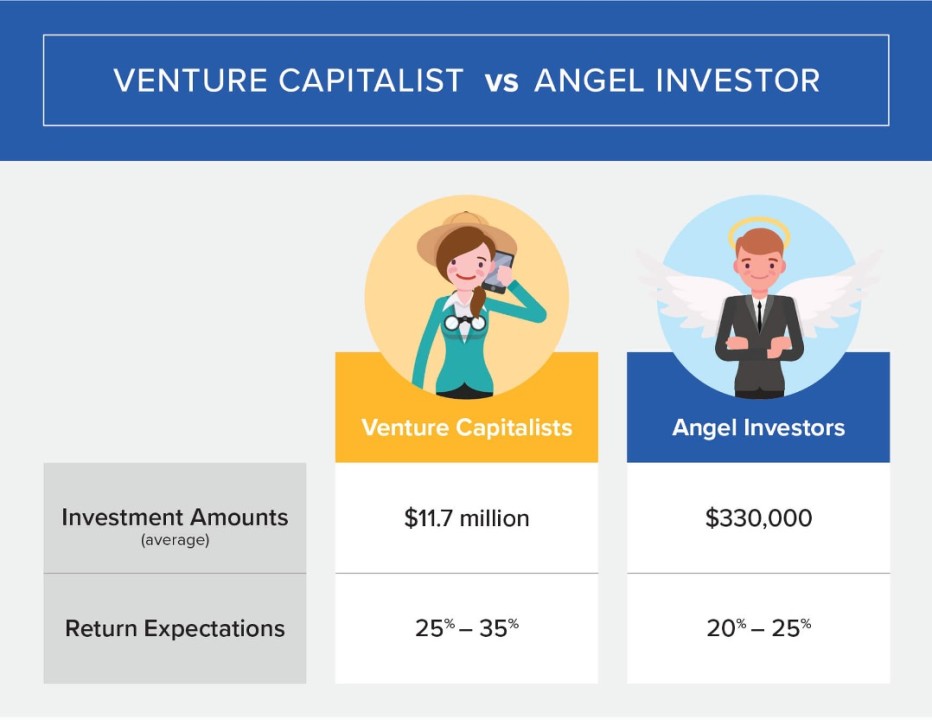Introduction
Navigating the landscape of funding options can take time and effort for small businesses and startups. Among the myriad options available, angel investors are a vital resource for early-stage companies seeking capital. This guide provides a comprehensive overview of angel investing, from understanding what angel investors are to effectively securing their investment. By exploring this topic in depth, we aim to equip you with the knowledge needed to leverage angel investment for your business’s growth.
What is Angel Investing?

Angel investing involves wealthy individuals, known as angel investors, providing capital to early-stage businesses in exchange for equity or convertible debt. This investment is crucial for startups still needing to be eligible for traditional bank loans or venture capital. In addition to funding, angel investors often offer mentorship, industry connections, and strategic guidance, playing a pivotal role in the startup’s development.
Understanding Angel Investors

Definition and Role
An angel investor is typically a high-net-worth individual who invests personal funds into early-stage companies. Unlike venture capitalists, who manage pooled funds from multiple investors, angel investors use their own money. This investment often comes with the added benefit of personal involvement, including mentorship and business advice.
Who Uses Angel Investors?
Angel investors are particularly beneficial for startups and small businesses that require seed capital to launch or scale their operations. These businesses often need access to traditional funding sources and turn to angel investors for financial support and strategic guidance. While some startups may self-fund or explore other funding options like crowdfunding, angel investment offers a viable alternative for many early-stage companies.
Angel Investing vs. Venture Capital

Key Differences
Angel investing and venture capital are both forms of private equity investment but differ significantly in several aspects:
- Source of Funds: Angel investors use personal funds, while venture capitalists invest funds from institutions like pension funds or endowments.
- Investment Size: Angel investments typically range from £20,000 to £100,000, whereas venture capital can range from £1 million to £10 million or more.
- Stage of Investment: Angel investors generally focus on early-stage companies, while venture capitalists often invest in later-stage businesses with proven revenue and growth potential.
Investment Characteristics
Angel investments are usually high-risk, high-reward opportunities with smaller investment amounts. Conversely, venture capital involves more considerable sums and is often aimed at businesses with established market presence and growth potential.
What Angel Investors Provide
Financial Support
Angel investors offer crucial funding in exchange for equity or convertible debt. This financial support helps startups develop their products, scale their operations, and achieve early growth milestones. In return, investors seek capital appreciation or dividends if the company becomes profitable.
Mentorship and Guidance
Beyond financial support, angel investors often provide valuable mentorship and industry connections. Their experience and network can significantly benefit startups, helping them navigate challenges and seize growth opportunities.
What Angel Investors Look for in a Business
Key Criteria
When angel investors assess potential investments, they evaluate several critical criteria to determine the viability and potential of the business:
- The Team: Investors seek a solid, capable team with relevant expertise and a proven track record. The team’s ability to execute the business plan and adapt to challenges is crucial.
- Market Opportunity: A compelling market opportunity is essential. Investors look for large and expanding markets with apparent customer demand, which indicates potential for significant growth.
- Competitive Advantage: To stand out in the market, a unique value proposition or competitive edge is necessary. This could be an innovative product, proprietary technology, or a distinctive business model that offers differentiation.
- Traction: Demonstrated traction is a positive signal. This includes indicators such as an existing user base, revenue streams, strategic partnerships, or other metrics that show the business is gaining momentum.
- Financials: A solid financial plan is vital. Investors expect detailed and realistic projections for costs, revenues, and returns. A well-prepared financial model helps in assessing the potential for profitability and sustainability.
- Exit Strategy: A clear and feasible exit strategy, such as plans for an initial public offering (IPO) or acquisition, is essential. This outlines how investors will eventually realise their returns.
- Alignment: It is crucial for the investor’s goals and values and the company’s vision to align. Investors prefer businesses that reflect their values and long-term objectives.
- Scalability: The business should exhibit significant growth potential. Investors look for opportunities that can scale effectively and generate substantial returns as they expand.
At What Stage Do Angel Investors Invest?
Investment Stages
Angel investors typically focus on early-stage companies, often called the ‘seed’ or ‘startup’ stage. Currently, the company is in the development phase with minimal revenue or market presence. However, some angel investors may also invest in more mature startups that have achieved initial traction and require additional funding for scaling.
What Sectors Do Angel Investors Invest In?

Common Sectors
Angel investors are active across a diverse range of sectors, reflecting their broad interests and the dynamic nature of the startup ecosystem. Some of the most prominent sectors include:
- Technology encompasses a variety of fields, including software development, hardware innovation, the Internet of Things (IoT), artificial intelligence (AI), and blockchain technologies. Due to its potential for rapid growth and high returns, technology remains a favourite for angel investors.
- Healthcare: Investors in this sector focus on biotechnology, medical devices, pharmaceuticals, and healthcare services. The healthcare sector is attractive because of its critical impact on well-being and potential for substantial advancements and profitability.
- Consumer Products: This area includes retail businesses, e-commerce platforms, and consumer services. Investors are drawn to this sector because of the constant demand for innovative products and services that cater to changing consumer preferences.
- Business Products: Angel investors often target enterprise software and B2B solutions, which address the needs of other businesses. This sector is appealing due to its potential for scalable solutions and steady revenue streams.
- Energy and Clean Technology: This sector, focused on renewable energy sources and sustainability initiatives, attracts investors interested in addressing environmental challenges while capitalising on the growing demand for green technologies.
- Agriculture and Food: Innovations in food production and agricultural technologies (agtech) are also popular among angel investors. This sector is significant due to its potential to improve food security and efficiency in agriculture.
While these sectors are commonly favoured, individual investors may also concentrate on specific sub-sectors or niche areas based on their expertise, experience, and interests.
What Do Angel Investors Want in Return?
Angel investors typically seek several forms of returns on their investments:
- Equity Ownership: Investors usually acquire a percentage of ownership in the company, giving them a stake in the business’s future profits and growth.
- Convertible Debt: Some investors provide funding through convertible debt, a type of loan that can be converted into equity later. This offers flexibility and potential upside if the company succeeds.
- Board Seats: In some cases, angel investors may request a seat on the company’s board of directors. This allows them to have a say in major business decisions and contribute their experience to the company’s strategic direction.
The return typically comes from capital appreciation or dividends if the company is profitable or sold.
How to Find an Angel Investor

Strategies for Finding Investors
- Angel Groups and Networks: Local groups and networks can connect startups with angel investors.
- Online Platforms: Websites like Wellfound, Gust, and DeckSender offer platforms to pitch businesses to investors.
- Referrals and Networking: Personal networks and referrals from successful entrepreneurs can lead to potential investors.
- Incubators and Accelerators: These programs often have established connections with angel investors.
- Entrepreneurial Events: Pitch competitions and startup fairs provide opportunities to meet investors.
Securing Angel Investor Funding

Key Steps
- Develop a Solid Business Plan: Craft a comprehensive business plan that outlines your company’s goals, strategies, and financial projections. This plan should detail how you intend to achieve your objectives and provide a roadmap for growth.
- Build a Strong Team: Assemble a team with the right mix of skills, experience, and dedication. Demonstrating that your team is capable and experienced can significantly boost investor confidence in your ability to execute the business plan.
- Show Traction: Provide tangible evidence of market validation, such as a growing user base, revenue figures, or significant partnerships. This traction indicates that your business model is working and gaining momentum.
- Create a Compelling Pitch: Develop a persuasive pitch articulating your business’s value proposition, market opportunity, and competitive edge. Your pitch should capture the investor’s interest and make a compelling case for why your business is worth investing in.
- Prepare for Negotiations: Be ready to discuss and negotiate investment terms and conditions. This includes understanding your funding needs, valuation, and the potential terms of the investment.
- Provide Detailed Financials: Present a thorough and transparent financial plan that includes detailed cost projections, revenue forecasts, and an exit strategy. This helps investors understand your business’s economic health and the potential return on their investment.
- Be Transparent: Demonstrate honesty about your business’s strengths and weaknesses. Transparency builds trust with investors and helps address potential concerns proactively.
Critical Stages of Securing Angel Investment

- Preparation: Develop a detailed business plan with financial projections and identify potential investors who align with your business goals.
- Introduction: Reach out to potential investors through networking, referrals, or investor platforms. Establishing a connection is the first step towards engaging them.
- Pitch: Present your business opportunity to investors through a well-prepared pitch. Highlight your business model, market potential, and team capabilities.
- Due Diligence: Investors will conduct a thorough review of your business information, including financials, market potential, and operational details, to assess the viability of the investment.
- Negotiations: Agree on the terms of the investment, including the amount of funding, equity stakes, and other conditions. Negotiations are critical to ensure mutual agreement and understanding.
- Closing: This stage involves formalising the investment agreement, finalising the investment deal, completing the necessary paperwork, and receiving the funding.
- Post-Investment: Engage with investors for ongoing support and mentorship. Investors often provide valuable guidance and resources to help your business grow and succeed.
Pros and Cons of Working with Angel Investors
Advantages
- Capital: Angel investors provide crucial financial resources that can significantly accelerate business growth. This funding helps cover initial costs, expand operations, and invest in new opportunities.
- Mentorship: In addition to financial support, angel investors often offer valuable industry expertise and guidance. Their experience can help them navigate challenges, refine business strategies, and make informed decisions.
- Networking: Investors usually have extensive professional networks. Access to these connections can open doors to potential customers, partners, and additional funding sources.
- Validation: Securing investment from an angel investor endorses your business idea. It signals to other stakeholders that your concept has been vetted and is considered promising.
- Flexibility: Angel investments often come in more flexible terms than traditional venture capital. Investors may be more willing to negotiate terms that align with your business’s needs and stage of development.
Disadvantages
- Dilution of Ownership: To receive funding, you may need to give up a percentage of equity in your business. This can reduce your ownership stake and influence over the company.
- Control: Angel investors may seek a say in company decisions or strategic direction. This influence can lead to conflicts if their vision differs from yours or they become heavily involved in operational matters.
- Expectation: Investors typically have high expectations for growth and performance. Meeting these expectations can be demanding and may put additional pressure on the business to achieve rapid success.
Conclusion
Angel investors can significantly transform small businesses and startups by providing essential financial backing, which is often crucial for early-stage companies. Beyond just capital, these investors bring a wealth of experience, strategic guidance, and valuable industry connections that can significantly influence a business’s development and trajectory. For entrepreneurs to fully leverage the advantages of angel investing, it is vital to grasp the specific criteria and expectations that angel investors have when considering potential investments.
Understanding these elements and effectively navigating the investment process can substantially increase a business’s likelihood of attracting angel investment. By implementing the strategic insights and recommendations detailed in this guide, companies can improve their chances of securing such investment, accelerate their growth, and set themselves up for significant future success and achievements.












